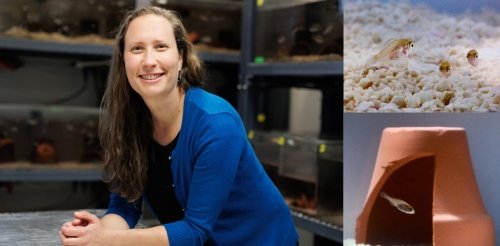The Secret Life of Fish
Pitzer College neuroscience professor Tessa Solomon-Lane wins an NSF grant to study the ways that social experiences early in life affect long-term behavior with the help of a surprising test subject.

The National Science Foundation has awarded a Faculty Early Career Development (CAREER) grant to Assistant Professor of Neuroscience Tessa Solomon-Lane. The prestigious CAREER program supports early-career faculty in leading advances in their fields and mentoring students.
Solomon-Lane's grant, titled “Early-Life Social Environments Drive Behavioral and Neural Mechanisms of Development,” will fund a five-year research project. Through funded summer research programs and increased resources for scientific discovery, Solomon-Lane's CAREER grant will support undergraduate researchers in her lab.
The project will explore causal relationships between early-life social experiences and long-term behavioral impacts by studying Burton’s Mouthbrooder, a species of fish found in parts of Africa. Solomon-Lane is focusing on behavioral neuroendocrinology (the study of how hormones and the brain interact).
“Topics in behavioral neuroendocrinology are relevant and impactful not just to the lived experiences of undergraduates, but also more broadly, to the laws impacting life-saving health care for pregnant people and trans people, as well as the environment,” said Solomon-Lane.